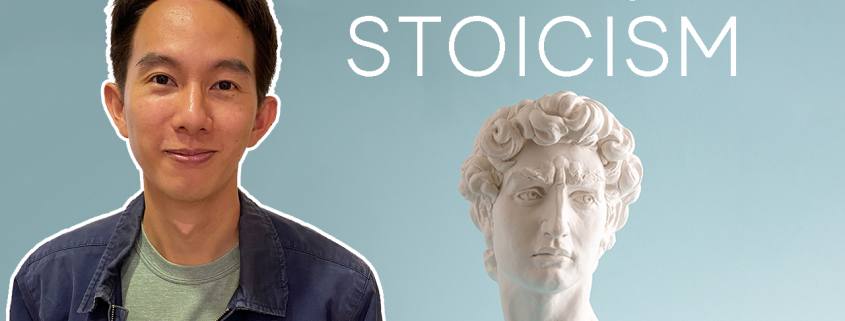What is Stoicism? (13 Practical Ways to Apply it in Your Life!)
Join our Telegram channel for more market analysis & trading tips: t.me/synapsetrading
Stoicism is a philosophy that originated in ancient Greece and Rome that emphasizes the development of self-control and fortitude as a means of overcoming destructive emotions.
It teaches that by accepting the present moment as it is, we can achieve peace of mind and inner harmony.
Through the practice of Stoicism, you can learn to live a more virtuous and fulfilling life, and gain valuable insights on how to handle stress and adversity.
In this blog post, I will explore the origins and benefits of this life philosophy, and practical ways you can apply it in your life.
Table of Contents
What is Stoicism?
Stoicism is a philosophy that originated in ancient Greece and was later developed by the Romans.
It is a philosophy of personal ethics that emphasizes the development of self-control and fortitude as a means of overcoming destructive emotions.
It teaches that by accepting the present moment as it is, we can achieve peace of mind and inner harmony.
The Stoics believed that by understanding the nature of the universe, and our place in it, we could live a virtuous life in accordance with reason and nature.
This approach advocates the development of self-control and resilience against destructive emotions, like anger, fear, or resentment.
The ultimate goal is to achieve a state of ataraxia (inner peace) and apatheia (emotionlessness) where the individual is not controlled by the emotions and is able to act rationally and ethically.
Origins of Stoicism
The origins of Stoicism can be traced back to ancient Greece, specifically to the city of Athens, where the philosopher Zeno of Citium founded the Stoic school of philosophy in the early 3rd century BCE.
Zeno was a student of the Cynic philosopher Crates of Thebes, but he rejected the Cynics’ way of life and instead focused on developing a rational system of ethics.
The Stoic philosophy was then developed by other philosophers such as Epictetus, Seneca, and Marcus Aurelius.
These philosophers are considered the three most prominent Stoics, and their texts, particularly the Enchiridion of Epictetus and the Meditations of Marcus Aurelius, continue to be read and studied today.
Stoicism was popular among the educated elite of ancient Rome and it has had a significant influence on Western thought, it was a philosophy that was primarily concerned with personal ethics and self-improvement, it was a way of life and a way to find peace and wisdom within oneself and the world.
Stoicism was taught in famous places like the Stoa Poikile or painted porch in Athens, the Stoic school was one of the most influential and prominent schools of philosophy in ancient Greece and Rome.
Benefits of Stoicism
Stoicism can offer many benefits for those who choose to adopt its principles and practices.
Some of these benefits include:
- Inner peace and contentment: By accepting the present moment and focusing on what is within our control, we can avoid becoming consumed by negative emotions such as anger, fear, or resentment. This can lead to a sense of inner peace and contentment.
- Improved ability to handle stress and adversity: Stoicism teaches us to maintain a clear and rational mindset in difficult situations, which can help us to better handle stress and adversity.
- Self-control and resilience: Stoicism emphasizes the importance of self-control and resilience, helping us to develop the ability to maintain our composure and make rational decisions, even in difficult or challenging situations.
- Virtue development: Stoicism emphasizes the development of virtues such as wisdom, integrity, courage and self-control which can improve one’s character and make them a better person.
- Rational perspective: It encourages rational thinking, rather than emotional reactions, and to see things in a more objective perspective.
- Improves decision making: By focusing on what is within our control, and letting go of what is not, we can make more effective and well-informed decisions.
- Self-awareness and self-improvement: Through the practice of stoicism, we can become more aware of our thoughts, emotions, and actions, which can help us to identify areas for self-improvement.
- Acceptance: Stoicism encourages acceptance of the present moment, and teaches that by accepting what we cannot change, we can let go of negative emotions, and find a sense of peace.
In general, Stoicism can lead to a more balanced, virtuous and rational way of life, which can have a positive impact on one’s personal and professional life.
How to Apply Stoicism in Your Life
To apply Stoicism in your life, you can try the following practical tips and examples:
- Self-awareness: Start by becoming more aware of your thoughts and emotions. Try to identify when you are getting caught up in negative emotions and try to step back and observe them from a distance. This will help you to understand your own thought patterns, which can aid in self-improvement.
- Acceptance: Practice acceptance by focusing on what is within your control and letting go of things you cannot control. This will help to reduce feelings of frustration and powerlessness, and improve your ability to cope with difficult situations.
- Mindfulness: Practice mindfulness, meditation and journaling to help with self-awareness and to practice acceptance. This can also improve emotional regulation, cognitive flexibility and self-awareness,
- Practice gratitude: Try to focus on what you have rather than what you don’t have, and practice gratitude for the positive things in your life.
- Separate what you can change and what you cannot change: Try to separate things you can change and things you cannot change, this will help to reduce feelings of frustration and powerlessness.
- Negative visualization: Practice negative visualization, where you imagine losing something you hold dear, so you can appreciate what you have. This will help you to develop a sense of perspective and gratitude.
- Cultivate virtues: Cultivate virtues such as integrity, courage, wisdom, and self-control. Incorporating these values into your life can improve your character and lead to a more virtuous and fulfilling life.
- Keep a rational perspective: Try to keep a rational perspective in difficult situations. Remember that emotions are temporary and that things will pass. Practice rationality and logical thinking.
- Read and study the works of Stoic philosophers: Read and study the works of Stoic philosophers such as Epictetus, Seneca, and Marcus Aurelius. These philosophers offer valuable insights and practical advice on how to apply Stoicism in daily life.
- Start small: Try to apply stoic principles in small aspects of your life, such as how to deal with a traffic jam, or an unresponsive coworker, small victories will make it easier to apply it to bigger aspects of your life.
- Be mindful of your actions: Be mindful of your actions and the choices you make, always try to act in a virtuous way.
- Focus on what is essential: Stoicism teaches to focus on what is essential, prioritize your goals and values, and let go of things that don’t align with them.
- Be resilient: Cultivate resilience, practice facing difficult challenges and setbacks with a calm, rational, and detached attitude.
All these tips and examples, if practiced regularly, can help you to integrate Stoicism into your daily life and improve your overall well-being.
Remember that the goal is not to suppress or ignore your emotions, but to develop the ability to manage them in a healthy way.
Keep in mind that it takes time and effort to develop a Stoic mindset, but with patience and dedication, you can learn to live a more fulfilling life in accordance with reason and virtue.
Famous Examples of Stoicism
There have been many famous historical figures who have applied Stoicism in their lives and have shared their practical advice on how to live a virtuous and fulfilling life.
Some of the most notable figures include:
- Epictetus: A slave turned philosopher who taught that the key to happiness is to focus on our own actions rather than external events. He taught that by understanding the difference between what we can control and what we cannot control, we can reduce feelings of frustration and powerlessness. Epictetus emphasized the importance of self-discipline, and stated that the mind should be trained to remain calm in the face of adversity.
- Seneca: A Roman philosopher and statesman who wrote extensively on the practical application of Stoicism in daily life. Seneca believed that by understanding the nature of the universe, we can live in accordance with reason and nature, and that we should focus on cultivating virtues such as wisdom, courage, and self-control. He also stressed the importance of self-awareness and self-improvement.
- Marcus Aurelius: Roman Emperor and Stoic philosopher who wrote in his famous book “Meditations” about how to live a virtuous life in the face of adversity. Marcus Aurelius advocated for the importance of virtue, self-control and rationality. He also emphasized the need to detach oneself from emotions, to focus on what is in one’s control, and to live a life of service to others.
All these figures and many others, offer practical advice on how to apply Stoicism in daily life, their works are still read and studied today, for the valuable insights and wisdom that they provide.
Concluding Thoughts
In conclusion, Stoicism is an ancient philosophy that can offer many benefits for those new to it.
It emphasizes the development of self-control and resilience against destructive emotions, and encourages accepting the present moment and focus on what is in one’s control, leading to inner peace and contentment.
It also offers valuable insights on how to handle stress and adversity, virtues development and rational thinking, making it a valuable tool to improve one’s personal and professional life and find inner peace.
Now that I have shared what stoicism is about, and the practical ways you can apply it in your life, do you think this is a life philosophy which you will want to adopt?
For those already embracing this philosophy, what are some other ways which you have applied stoicism in your life?
Let me know in the comments below.

If you are excited to get more life hacks, also check out: “Beyond Financial Freedom: An Unofficial Guide to Living Your Best Life”
 Our flagship mentoring program is suitable for both beginners and advanced traders, covering the 4 strategies which I used over the past 15 years to build up my 7-figure personal trading portfolio.
Our flagship mentoring program is suitable for both beginners and advanced traders, covering the 4 strategies which I used over the past 15 years to build up my 7-figure personal trading portfolio.
 If you're looking for a reputable brokerage that covers all products (SG stocks, US stocks, global stocks, bonds, ETFs, REITs, forex, futures, crypto) and has one of the lowest commissions, this is what I currently use.
If you're looking for a reputable brokerage that covers all products (SG stocks, US stocks, global stocks, bonds, ETFs, REITs, forex, futures, crypto) and has one of the lowest commissions, this is what I currently use.
After trading for 18 years, reading 1500+ books, and mentoring 1000+ traders, I specialise in helping people improve their trading results, by using tested trading strategies, and making better decisions via decision science.






Leave a Reply
Want to join the discussion?Feel free to contribute!